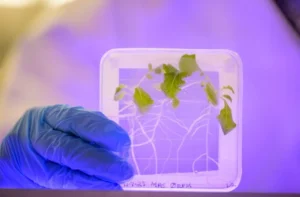As humanity gambles further into space disquisition, maintaining the health and well-being of astronauts becomes consummate. One unanticipated challenge has surfaced in the form of space salads, as experimenters have discovered that flora intended for consumption can get infected under microgravity conditions. This disclosure raises enterprises about the implicit impact on astronauts’ nutrition and the need for innovative results to cultivate safe and healthy food in space.
Microgravity’s Influence on Plant Growth, or the condition of near-lightness endured in space, has been known to affect colorful natural processes, including factory growth. Shops calculate graveness for exposure and proper development of roots and shoots. In microgravity, these processes are disintegrated, leading to altered growth patterns and implicit vulnerability to infections.
Infection Pitfalls In Space Salads
Recent trials conducted in space territories have revealed that flora cultivated for consumption by astronauts are susceptible to infections. The International Space Station (ISS), in its research, found that there is a potential health risk with space salads. The microgravity terrain creates a unique challenge, as the absence of gravity-driven water and nutrient distribution can compromise the defense mechanism against pathogens. Fungal and bacterial infections are common in some cases, raising enterprises about the safety of space-grown yield. Thus eventually making space salad a matter of concern.

Nutritive Enterprises For Astronauts
Astronauts calculate a balanced and nutritional diet to maintain their health and energy situations during extended space operations. Fresh yield, similar to lush flora, is pivotal for furnishing essential vitamins and minerals. Mollifying the issue, researchers are underway to find innovative results. Experimenters are exploring advanced civilization tiles, similar to hydroponics and aeroponics, which can offer controlled surroundings for factory growth. These systems aim to compensate for the lack of graveness by icing optimal water and nutrient distribution. Hence reducing the liability of infections. Also, advancements in space husbandry technologies, including the development of factories resistant to microgravity stress, are looked at. These flexible crops could potentially repel the challenges of space civilization and enhance the overall quality of food products for astronauts.
The disclosure that space salads can be susceptible to infections under microgravity conditions underscores the complications of cultivating food in space. As space agencies plan for longer-duration operations, including implicit peregrinations to Mars, addressing these challenges becomes increasingly pivotal. Ongoing exploration and technological advancements will play a vital part in ensuring access to safe and nutritional food. Thus promoting extra adequacy towards their health and well-being during future space trials.



